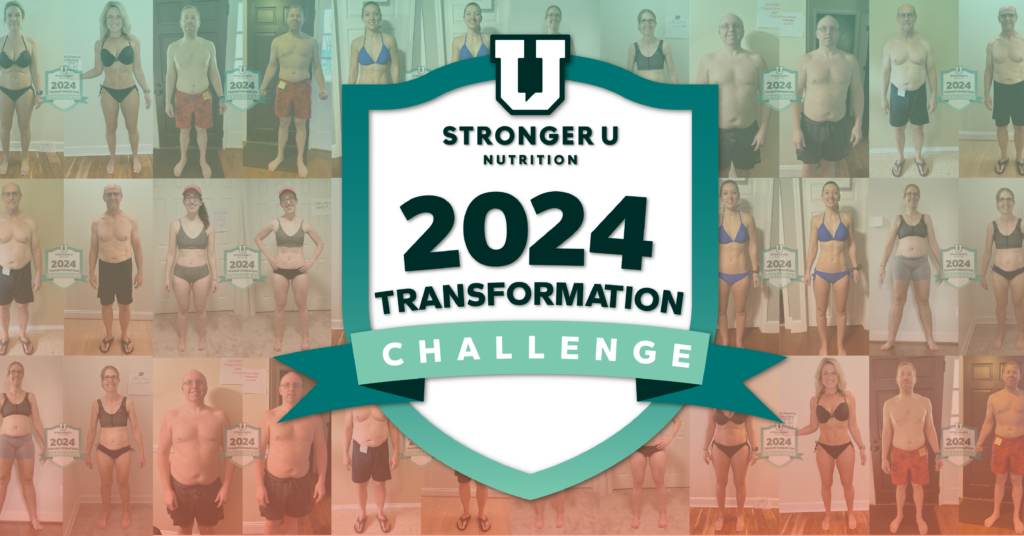If you’re here, you’re likely interested in leveling up your training and body composition results, just like many Stronger U members. While the majority of impact will be found through our nutrition habits, sometimes additional supplementation is needed to either fill gaps in our diet or enhance performance. With thousands of supplements on the market, it’s challenging to know which are necessary, effective, and safe. One of the most studied and universally rewarding supplements proven to be safe in both short and long-term uses is creatine.
Creatine is not just for high-level athletes, it’s also beneficial for the active and aging population in increasing lean muscle mass and improving capacity in short, high-intensity exercise. When combined with strength training, there are positive outcomes for sarcopenia and maintaining or gaining muscle. Beyond performance, creatine helps with recovery and cognitive function.
In this blog, we dive into the benefits of this powerhouse supplement.
What is Creatine?
Creatine is a compound derived from the amino acids methionine, glycine and arginine. It’s primarily stored in muscle, and our bodies make creatine on its own, as well as consume it through protein sources like eggs, meat, and fish. The body can make about 1g of creatine per day.(5) However, to experience its benefits, many individuals choose to supplement with creatine powder or capsules.
How Creatine helps body composition including weight loss and muscle building efforts
Increased Muscle, Fat Loss & Performance
Creatine supplementation combined with resistance training may decrease fat mass more than resistance training alone(1), increase muscle mass and increase maximal weight lifted.(9) Because creatine helps increase ATP availability, which provides energy for short, intense exercises, it supports increased output of effort and intensity in workouts and, therefore, more energy/calories utilized during training. More muscle mass also helps metabolic rate, as the increased muscle requires more energy/calories to burn at rest.In general, well-trained muscle is more efficient as using calories.(6)
Improved Recovery
Creatine may reduce exercise-induced fatigue and improve recovery between bouts of sprints, and between workouts. This can indirectly support weight loss by allowing you to maintain a consistent exercise routine.
Enhanced Bone Health
A study showed that when combined with moderate to high-intensity training, creatine can improve skeletal muscle and bone health.(8) This happens indirectly. As muscles grow stronger from exercise, they pull more on the bones. The more they pull on the bones, the stronger your bones get.
Improved Cognitive Function
Emerging research suggests that creatine may positively impact cognition, such as brain function, memory, and mood. Studies show that creatine improved measures of memory performance in healthy individuals, especially in older adults.(7)
Creatine Myths vs. Facts
Like with most supplements, there’s a lot of misinformation online that can lead to confusion about whether creatine can be right for you. We’re debunking common myths with facts that will help you make an informed decision whether it’s a valuable addition to your health and fitness journey.
Myth: “It’s a steroid.”
Fact: Creatine is a compound from amino acids made in the body and consumed through dietary sources like animal products such as meat, fish, eggs.
Myth: “Creatine will make me hold water/look bloated.”
Fact: Creatine will not cause bloating. This myth is likely from the fact that creatine can increase intracellular volume, but there are studies suggesting it does not alter total body water (intra or extracellular) relative to muscle mass over longer periods of time. As a result, creatine supplementation may not lead to water retention.(2)
Myth: “It’s bad for my kidneys.”
Fact: Similar to protein intake, for a healthy individual with no existing renal (kidney) dysfunction, creatine can be a safe supplement. For those with an existing renal disease, the research is mixed, and the American College of Sports Medicine (ACSM) takes a more cautious approach to safeguard individuals with renal concerns.
Myth: “You only should take creatine if you’re a bodybuilder.”
Fact: Maintaining and building muscle mass is important for everyone whether you want to be functionally stronger, toned, and able to preserve bone health and prevent disease.
Myth: “I get enough protein, so I won’t benefit from it.”
Fact: Creatine is complementary to an adequate high-protein diet. The positive effects of creatine would be enhanced when paired with a protein-rich diet and resistance training.
Selecting a good creatine supplement
Creatine is widely available and generally cost-effective. However, not all supplements are created equal, and there are a couple things to consider when deciding whether a particular option is high quality.
Form: There are various forms of creatine on the market, but Creatine Monohydrate is the #1 form you should be taking for its effectiveness, high bioavailability, longevity on the market, and history of in-depth research.
Safety: Supplements are not regulated by the FDA like our food supply or pharmaceuticals are. Therefore, when choosing supplements, there should be even more thought and consideration that goes into buying a product. For athletes, to safeguard eligibility in the NCAA for example, “NSF Certified for Sport” and “Informed Choice for Sport” labeling is a good place to see what Creatine supplements are third party tested both for ingredients and efficacy. Of course, no supplement is taken without risk of testing for a banned substance. So, knowing your organization or league’s rules is imperative to protect an athlete in sport.
When and how much creatine to take for best results
The most important element in terms of timing creatine supplementation is consistency. The recommended dose is 3-5g daily. Be sure to check individual products for serving size and specific amounts, as they vary. It’s often asked if taking it before or after a workout is superior, and it really is about what works best for you. Either timing will be an effective strategy to increase muscle mass and strength. (10) For optimal recovery, there is some significance to taking creatine with your post-workout meal or snack, but for the general population, doing what works best for you and doing so consistently is most impactful.
Conclusion
Supplements can be a complement to a healthy diet and exercise regimen. Still, they will never be a replacement for eating quality protein and taking care of the holistic components of your health and lifestyle. Those with pre-existing renal dysfunction/disease should be cautious when considering a creatine supplement, as the research is limited and mixed. Please check with your Registered Dietitian or health practitioner for specific guidance on supplements.
*This blog is for educational purposes only and is not medical advice or providing a specific recommendation to readers.
References:
(1) Forbes SC, Candow DG, Krentz JR, Roberts MD, Young KC. Changes in Fat Mass Following Creatine Supplementation and Resistance Training in Adults ≥50 Years of Age: A Meta-Analysis. Journal of Functional Morphology and Kinesiology. 2019; 4(3):62. https://doi.org/10.3390/jfmk4030062
(2) Antonio, J., Candow, D.G., Forbes, S.C. et al. Common questions and misconceptions about creatine supplementation: what does the scientific evidence really show?. J Int Soc Sports Nutr 18, 13 (2021). https://doi.org/10.1186/s12970-021-00412-w
(3) Forbes SC, Candow DG, Neto JHF, Kennedy MD, Forbes JL, Machado M, Bustillo E, Gomez-Lopez J, Zapata A, Antonio J. Creatine supplementation and endurance performance: surges and sprints to win the race. J Int Soc Sports Nutr. 2023 Dec;20(1):2204071. doi: 10.1080/15502783.2023.2204071. PMID: 37096381; PMCID: PMC10132248.
(4) Burke Louise and Vicki Deakin. Clinical Sports Nutrition. Fifth ed. McGraw-Hill Education 2015.
(5) Cooper R, Naclerio F, Allgrove J, Jimenez A. Creatine supplementation with specific view to exercise/sports performance: an update. J Int Soc Sports Nutr. 2012;9:33.
(6) Bauer J, Biolo G, Cederholm T, Cesari M, Cruz-Jentoft AJ, Morley JE, Phillips S, Sieber C, Stehle P, Teta D, Visvanathan R, Volpi E, Boirie Y. Evidence-based recommendations for optimal dietary protein intake in older people: a position paper from the PROT-AGE Study Group. J Am Med Dir Assoc. 2013 Aug;14(8):542-59. doi: 10.1016/j.jamda.2013.05.021. Epub 2013 Jul 16. PMID: 23867520.
(7) Konstantinos Prokopidis, Panagiotis Giannos, Konstantinos K Triantafyllidis, Konstantinos S Kechagias, Scott C Forbes, Darren G Candow, Effects of creatine supplementation on memory in healthy individuals: a systematic review and meta-analysis of randomized controlled trials, Nutrition Reviews, Volume 81, Issue 4, April 2023, Pages 416–427, https://doi.org/10.1093/nutrit/nuac064
(8) Stares, Aaron PT, DPT, CSCS; Bains, Mona PhD. The Additive Effects of Creatine Supplementation and Exercise Training in an Aging Population: A Systematic Review of Randomized Controlled Trials. Journal of Geriatric Physical Therapy 43(2):p 99-112, April/June 2020. | DOI: 10.1519/JPT.0000000000000222
(9) Dempsey, Rania L. et al. “Does oral creatine supplementation improve strength? A meta-analysis.” The Journal of family practice 51 11 (2002): 945-51 .
(10) Forbes, Scott C. et al. “Creatine timing on muscle mass and strength: Appetizer or Dessert?” (2014).









